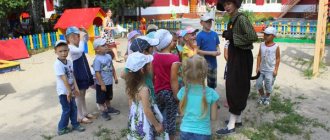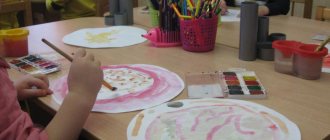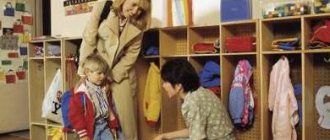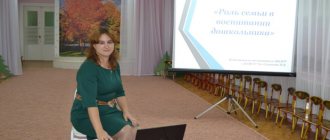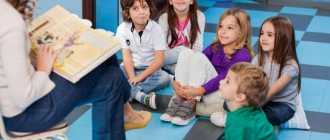Final parent meeting in the middle group “What we have become.”
Final parent meeting in the middle group
"What we have become."
Target:
Introduce parents to the achievements and progress of children during the school year; summarize the results of the joint activities of teachers, children and their parents.
Tasks:
- analyze the results of educational, cultural and leisure activities of children during the school year
- promote the creation of an environment of general joy and good mood
- promote communicative competence in children in the process of theatrical activities; cultivate friendship, mutual assistance
- involvement of parents in the pedagogical process.
Materials:
costumes with hats with characters from the fairy tale
“Teremok”
, presentation
“What We Have Become
.
Preliminary work: reading and presenting the fairy tale “Teremok”
, learning poems about spring flowers and insects, guessing riddles, working on attributes, working with pieces of music, filling out questionnaires with parents.
Agenda:
- Children's performance
- Summing up the results for the 2017-2018 academic year
- Awards
- Recommendations for organizing a healthy diet in the summer
- Questioning of parents “assessment of the quality of work of an educational institution”
Progress of the meeting:
Hello, dear parents, we are very glad to see you and I really want to start our communication with the words from the song “It’s great that we are all gathered here today...”
.
Our children are small but very bright fireflies that illuminate and warm our lives like rays of the sun. Children enter the group to the music.
1) Learned to think and count, give complete answers. We now know how to be friends and cherish this friendship.
2) We’ll tell you about this and show you a little. As they grew smarter and matured, they overcame all difficulties.
3) We are very loyal friends. We've been with you all year. Dancing, counting, measuring everything, that's what we taught!
4) It wasn’t easy for us all in the classes. We drew people and, of course, animals.
Watercolor, gouache, crayons.
You have become friends with us.
5) To be strong and agile, We loved training. Jump, run, throw a ball. Play different games,
Never get tired.
6) We learned to sing, dance, and play different roles. And, of course, without a doubt, We can all perform.
7) They read stories to us, We learned poems, We can name any fairy tale as a keepsake!
 We know ecology and respect nature. We are friends with a flower, an animal - the world of nature is familiar to us.
We know ecology and respect nature. We are friends with a flower, an animal - the world of nature is familiar to us.
Educator
:
— I was walking along the path and found a beautiful box. And the box is not simple, it’s magical – that’s what it is! - What a beautiful box, I wonder what’s in it? (trying to open it, but it won't open)
.
- Maybe a fairy tale? The fairy tale is hidden in a riddle. Well, let's try to guess.
- A small ball is fumbling under the bench. (Mouse)
- the box opens, and the teacher takes out a toy - a mouse, and puts it on the table
- In the summer you will find it in the swamp. Green frog, who is it? (Frog)
- He rushes without looking back, only his heels sparkle. Quickly guess who it is? (Bunny)
- Those who walk around in cold winter are angry and hungry. (Wolf)
- Cunning cheat, red head. The fluffy tail is beautiful! What is her name? (Fox)
- In winter he sleeps, in summer he stirs up the hives. (Bear)
- Well done boys! We solved all the riddles, that's how many toys the magic box gave us!
Mystery:
In a clearing in the forest There was a painted house, I could hide all the little animals, What kind of house? (Teremok)
So our heroes are from what fairy tale? Production of the fairy tale "Teremok"
— The guys were artists! And you guys showed a fairy tale! The artists and spectators were all good! Let's clap from the bottom of our hearts!
Our children showed their best side. And we decided to treat everyone with delicious sweets.
Discussion of organizational issues:
1. "What We Have Become":
It is very pleasant to note that our children learned a lot and showed good results in mastering the educational program 85-87%, our group took an active part in the life of the entire kindergarten: a reading competition, the exhibition “Spring is Red”
,
“Father Frost’s Workshop”
, drawing competition
“”
, sports and entertainment events “Mom, Dad and I are a sports family”, “Visiting the vitamin, matinees “Autumn, we ask for a visit”, “Pranks of Grandma Purga”, “Best mother in the world”,
“Earth Day”
. We went on an excursion to PKSM. The children performed well during the open display of the results of educational activities. And now I will tell you what we did during this period. In kindergarten, children not only play, but also work very hard, they develop qualities such as curiosity, the ability to fantasize and express their thoughts verbally, they learn to craft, draw, listen and remember,
Also during this period, we instilled in children neatness, the habit of taking care of their appearance, the habit of washing themselves, washing their hands before eating, when dirty, and after using the toilet. They reinforced the ability to use a comb and a handkerchief. We improved the skills of careful eating, the ability to properly use cutlery (spoon, fork), independently set tables and prepare for meals, straighten and make beds and put away toys after playing, and clean up the group and on the playground. We taught children to show interest in the rules of safe behavior in the group and outside the kindergarten. Children have an idea of what a healthy person is, what helps him to be healthy. To do this, we conducted cycles of games: didactic, role-playing games, as well as various thematic conversations to consolidate the acquired skills.
During this school year, children learned:
- Correctly name a variety of objects that surround them indoors and on the site, on the street; know their purpose, name the properties and qualities that are accessible to perception and examination.
- They have learned to count up to 5, know and name numbers, determine equalities and inequalities based on counting groups of objects in situations where objects in groups are located at different distances from each other, when they differ in size, in the shape of their location in space.
- They show interest in objects and phenomena that they did not (do not have) the opportunity to see.
- They talk about family, family life, traditions;
- actively participate in events prepared in the group at the preschool educational institution.
- Participate in observations of plants, animals, birds; share their knowledge about living and non-living things; They do not tear or break plants, they treat living beings with care, and try not to harm them.
Our group is dominated by children aged 4 years. During this period, it is necessary to develop motor skills, memory, and speech. For this purpose, there are now a lot of different teaching materials, games, construction sets, etc. Play with your child, pay more attention to him - this is the best investment in your future! Also, on the eve of the summer holidays and holidays, we ask you to pay special attention to compliance with safety rules at home and on the street, when traveling to nature and water bodies. A big request to parents - develop the social skills of your children, warn them about the dangers that may occur in their lives (for example, do not communicate with strangers, behave correctly in transport and at a train station, at the airport, etc.)
We would like to express our gratitude to you for your participation in the activities of the kindergarten, participation in events and creative competitions, for your assistance in creating a subject-specific development environment.
Thank you for the fact that, despite your busy schedule and lack of time, you find the strength not to succumb to life’s circumstances and remain indifferent to the life of the group and kindergarten.
We would like to thank you very much!
There are not enough words of gratitude for us. To meet such kind and glorious people, In our life, it is grace as it is.
There are no problems that are too big for you, Any problems can be solved, For emergency and quick help
We are ready to put in all our efforts! (presentation of certificates to parents).
2. Health-improving work with children in the summer is the main part of treatment and preventive measures. To ensure that the summer period is useful for your children, we offer a presentation on organizing a healthy diet and reminders... . (teacher Lumanova S.M.).
Test for work
Psychologists offer a different designation for each letter. If you analyze the initials, they can tell about some personality traits, creative abilities, and inclinations. Of course, the results obtained cannot be considered reliable, but it doesn’t hurt to take a closer look at them. What does each letter mean?
- A is a symbol of power and strength.
- B - tendency to have serious feelings.
- B - lack of consistency, inability to systematize events.
- G - mystery.
- D - the ability to attract other people to communicate.
- E - resistance to life's difficulties.
- F - lack of self-confidence.
- Z - suspiciousness, financial difficulties, constant dissatisfaction.
- And - tension.
- K - significant demands and excessive nervousness.
- L - excellent logic, creative ingenuity.
- M - penchant for work, punctuality.
- H - great energy and ambition.
- O - excessive emotionality, constant worry.
- P - excessive modesty.
- R - emotionality, constant tension.
- C - systematic depression, nervousness, depression.
- T - a state of constant search, a dream of ideals.
- U - fear, increased intuition.
- F - ability to adapt.
- X - instability of feelings.
- C - the desire to hide experiences in oneself.
- H - constancy.
- Ш - uncompromisingness, jealousy.
- Ш – excellent intellectual capabilities.
- E - constant search for stability and harmony.
- Yu - huge ambitions.
- I am overly intelligent.
Do you agree with the research that scientists have conducted? Do children have these qualities? We are different, but each baby is individual and unique. Together we must help him show his creative abilities, gain communication skills, and give the child the opportunity for self-development.
When drawing up the minutes of the final parent meeting in the middle group, the teacher indicates all the parents’ proposals for further joint activities.
Speech by a child psychologist
What are modern preschoolers like? Research conducted in a preschool institution has revealed the psychological characteristics of children:
- in the middle group, the guys are anxious, demanding, sometimes even aggressive;
- they are sociable, but are not always able to concentrate on one type of activity;
- the kids are restless, it is difficult for the teacher to keep them in place during class;
- many are lagging behind in speech development; there are children in the group who require professional help from a speech therapist;
- the children are addicted to electronic devices, have problems with fine motor skills, have been shown to have underdeveloped brain structures, and are unable and unwilling to think while playing;
- Not all children follow the rules of behavior.
The kids did not become difficult, but simply changed. But they still need mother's love, father's hugs, and grandmother's affectionate hands. Considering the social changes that are taking place in our country, we note that it has become much more difficult for parents. Many people have to work late. To count on good material income, you have to sacrifice time to spend communicating with your child. Do not forget, dear parents, that first of all the baby does not need bright and expensive toys, but attention and parental care. When he grows up, there will be no cars or dolls in his memory, but happy moments associated with going fishing, reading books, and making a delicious cake. Try to find as much free time as possible to communicate with your kids!
Progress of the conversation
Where to start final The middle group is characterized by the fact that the children already have certain communication skills, so the teacher has the opportunity to conduct research on the activity of their children and identify their creative abilities.
To begin with, the teacher greets the parents and talks about the topic of the meeting. Next, the teacher invites moms and dads to talk about what their kids love. Listening to the parents' answers, the teacher accompanies them with remarks that were expressed by the children themselves. In order to confirm your words, you can make a short video for the general parent meeting in which the children talk about their interests, hobbies, favorite subjects and activities.
Procedure
The final parent meeting in the middle group involves a child psychologist or teacher conducting a detailed analysis regarding the physiological and intellectual changes that occurred with the children during the period under review. A music worker, a nurse, and a physical education teacher are invited.
The procedure for holding a meeting also includes a protocol for the final meeting in the middle group. A representative from the preschool institution is selected to conduct it. In addition, a chairman is selected, who can be the teacher himself. Parents are introduced to the issues that will be considered during the conversation and are encouraged to ask questions after completing the theoretical block. The final parent meeting in the middle group is aimed at finding solutions to problems and developing directions for activity in the senior group of the kindergarten.
Teacher's speech
We are starting our final parent meeting. Middle group, end of the year, it's time to find out what we managed to do? What should you pay attention to? We will have to figure this out together with you, dear parents. First, let's try to figure out what modern preschoolers are like.
Adults often say that children have become completely different; they don’t want to communicate, study, or help around the house. But haven't the parents themselves changed? The society in which we live is rapidly changing, information technology is improving, and the rhythm of life is increasing. Our children spend their childhood in different conditions, so the main task of adults is to help them adapt.
